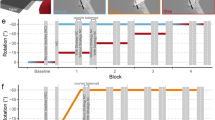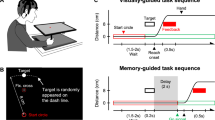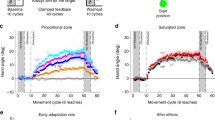Abstract
Our movements and movement outcomes are disturbed by environmental changes, leading to errors. During ongoing environmental changes, people should correct their movement using sensory feedback. However, when the changes are momentary, corrections based on sensory feedback are undesirable. Previous studies have suggested that implicit motor adaptation takes place despite the realization that the presented visual feedback should be ignored. Although these studies created experimental situations in which participants had to continuously ignore the presented visual feedback, in daily lives, people intermittently encounter opportunities to ignore sensory feedback. In this study, by intermittently presenting visual error clamp feedback, always offset from a target by 16° counterclockwise, regardless of the actual movement in a reaching experiment, we provided intermittent opportunities to ignore the visual feedback. We found that in the trials conducted immediately after presenting the visual error clamp feedback, reaching movements shifted in the direction opposite to the feedback, which is a hallmark of implicit motor adaptation. Moreover, the magnitude of the shift was significantly correlated with the rate of motor adaptation to gradual changes in the environment. Therefore, the results suggest that people unintentionally react to momentary environmental changes, which should be ignored. In addition, the sensitivity to momentary changes is greater in people who can quickly adapt to gradual environmental changes.




Similar content being viewed by others
Data availability
The datasets of the current study are available at figshare (https://doi.org/10.6084/m9.figshare.21212843.v3).
References
Avraham G, Keizman M, Shmuelof L (2020) Environmental consistency modulation of error sensitivity during motor adaptation is explicitly controlled. J Neurophysiol 123:57–69. https://doi.org/10.1152/jn.00080.2019
Avraham G, Morehead JR, Kim HE, Ivry RB (2021) Reexposure to a sensorimotor perturbation produces opposite effects on explicit and implicit learning processes. PLoS Biol 19:e3001147. https://doi.org/10.1371/journal.pbio.3001147
Gastrock RQ, Modchalingam S, ’t Hart BM, Henriques DYP (2020) External error attribution dampens efferent-based predictions but not proprioceptive changes in hand localization. Sci Rep 10:19918. https://doi.org/10.1038/s41598-020-76940-3
Gonzalez Castro LN, Hadjiosif AM, Hemphill MA, Smith MA (2014) Environmental consistency determines the rate of motor adaptation. Curr Biol 24:1050–1061. https://doi.org/10.1016/j.cub.2014.03.049
Herzfeld DJ, Vaswani PA, Marko MK, Shadmehr R (2014) A memory of errors in sensorimotor learning. Science 345:1349–1353. https://doi.org/10.1126/science.1253138
Hutter SA, Taylor JA (2018) Relative sensitivity of explicit reaiming and implicit motor adaptation. J Neurophysiol 120:2640–2648. https://doi.org/10.1152/jn.00283.2018
Izawa J, Shadmehr R (2011) Learning from sensory and reward prediction errors during motor adaptation. PLoS Comput Biol 7:e1002012. https://doi.org/10.1371/journal.pcbi.1002012
Kasuga S, Hirashima M, Nozaki D (2013) Simultaneous processing of information on multiple errors in visuomotor learning. PLoS One 8:e72741. https://doi.org/10.1371/journal.pone.0072741
Kim HE, Morehead JR, Parvin DE et al (2018) Invariant errors reveal limitations in motor correction rather than constraints on error sensitivity. Commun Biol 1:19. https://doi.org/10.1038/s42003-018-0021-y
Kim HE, Parvin DE, Ivry RB (2019) The influence of task outcome on implicit motor learning. Elife 8:e39882. https://doi.org/10.7554/eLife.39882
Kim OA, Forrence AD, Mcdougle SD (2022) Motor learning without movement. PNAS 119:e2204379119. https://doi.org/10.1073/pnas
Kleiner M, Brainard DH, Pelli DG et al (2007) What’s new in Psychtoolbox-3? Perception 36:1–16
Lee K, Oh Y, Izawa J, Schweighofer N (2018) Sensory prediction errors, not performance errors, update memories in visuomotor adaptation. Sci Rep 8:16483. https://doi.org/10.1038/s41598-018-34598-y
Mazzoni P (2006) An implicit plan overrides an explicit strategy during visuomotor adaptation. J Neurosci 26:3642–3645. https://doi.org/10.1523/JNEUROSCI.5317-05.2006
Morehead JR, Taylor JA, Parvin DE, Ivry RB (2017) Characteristics of implicit sensorimotor adaptation revealed by task-irrelevant clamped feedback. J Cogn Neurosci 29:1061–1074. https://doi.org/10.1162/jocn_a_01108
Nikooyan AA, Ahmed AA (2015) Reward feedback accelerates motor learning. J Neurophysiol 113:633–646. https://doi.org/10.1152/jn.00032.2014
Schlerf JE, Xu J, Klemfuss NM et al (2013) Individuals with cerebellar degeneration show similar adaptation deficits with large and small visuomotor errors. J Neurophysiol 109:1164–1173. https://doi.org/10.1152/jn.00654.2011
Shadmehr R, Smith MA, Krakauer JW (2010) Error correction, sensory prediction, and adaptation in motor control. Annu Rev Neurosci 33:89–108. https://doi.org/10.1146/annurev-neuro-060909-153135
Stark-Inbar A, Raza M, Taylor JA, Ivry RB (2017) Individual differences in implicit motor learning: task specificity in sensorimotor adaptation and sequence learning. J Neurophysiol 117:412–428. https://doi.org/10.1152/jn.01141.2015
Taylor JA, Ivry RB (2011) Flexible cognitive strategies during motor learning. PLoS Comput Biol 7:e1001096. https://doi.org/10.1371/journal.pcbi.1001096
Taylor JA, Ivry RB (2013) Context-dependent generalization. Front Hum Neurosci 7:171. https://doi.org/10.3389/fnhum.2013.00171
Tsay JS, Parvin DE, Ivry RB (2020) Continuous reports of sensed hand position during sensorimotor adaptation. J Neurophysiol 124:1122–1130. https://doi.org/10.1152/jn.00242.2020
Tsay JS, Avraham G, Kim HE et al (2021a) The effect of visual uncertainty on implicit motor adaptation. J Neurophysiol 125:12–22. https://doi.org/10.1152/jn.00493.2020
Tsay JS, Kim HE, Parvin DE et al (2021b) Individual differences in proprioception predict the extent of implicit sensorimotor adaptation. J Neurophysiol 125:1307–1321. https://doi.org/10.1152/jn.00585.2020
Tsay JS, Haith AM, Ivry RB, Kim HE (2022) Interactions between sensory prediction error and task error during implicit motor learning. PLoS Comput Biol 18:e1010005. https://doi.org/10.1371/journal.pcbi.1010005
Wei K, Körding K (2009) Relevance of error: what drives motor adaptation? J Neurophysiol 101:655–664. https://doi.org/10.1152/jn.90545.2008
Funding
This work was supported by JSPS KAKENHI Grant-in-Aid for Scientific Research (B) 18H03143 (MOA).
Author information
Authors and Affiliations
Contributions
All authors contributed to the study conception and design. Material preparation, data collection, and analysis were performed by NM. The first draft of the manuscript was written by NM and MOA commented on the manuscript versions. All authors read and approved the final manuscript.
Corresponding author
Ethics declarations
Conflict of interest
The authors have no relevant financial or non-financial interests to disclose.
Ethical approval
This study was approved by the Ethics Committee of the Faculty of Education at Hokkaido University (approval number: 21-08).
Additional information
Communicated by Bill J Yates.
Publisher's Note
Springer Nature remains neutral with regard to jurisdictional claims in published maps and institutional affiliations.
Supplementary Information
Below is the link to the electronic supplementary material.
Rights and permissions
Springer Nature or its licensor (e.g. a society or other partner) holds exclusive rights to this article under a publishing agreement with the author(s) or other rightsholder(s); author self-archiving of the accepted manuscript version of this article is solely governed by the terms of such publishing agreement and applicable law.
About this article
Cite this article
Matsuda, N., Abe, M.O. Implicit motor adaptation driven by intermittent and invariant errors. Exp Brain Res 241, 2125–2132 (2023). https://doi.org/10.1007/s00221-023-06667-w
Received:
Accepted:
Published:
Issue Date:
DOI: https://doi.org/10.1007/s00221-023-06667-w




